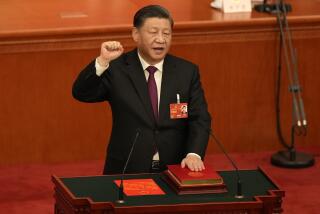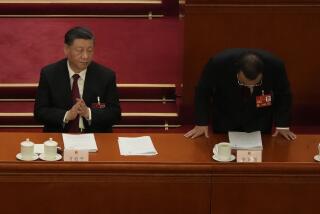Zhao Takes a Bow as the New Champion : Hands of Chinese Reformers Strengthened by Party Congress
- Share via
BEIJING — When Zhao Ziyang appeared before journalists this week as China’s newly confirmed Communist Party chief, he clasped his hands together and shook them above each shoulder like a victorious prizefighter.
The apparently impulsive gesture--made before 400 Chinese and foreign journalists at a Monday reception in the Great Hall of the People--was appropriate.
Zhao, 68, China’s premier and general secretary of the Communist Party, and his mentor, senior leader Deng Xiaoping, 83, had concluded a momentous victory. The 13th National Congress of the Communist Party and the new Central Committee it elected had just finished reshaping the political landscape of China.
Nearly 2,000 delegates to the eight-day congress gave a show of unanimous support for a new ideology that strengthens the reformist Zhao’s hand by justifying anything that contributes to economic growth.
Through that action, the Chinese Communist Party implicitly but fundamentally repudiated the ideology of class struggle and revolutionary egalitarianism advocated by the late Chairman Mao Tse-tung.
Deng, by retiring from his own top party positions, took down with him every major critic of his policies of openness to the outside world and market-oriented domestic reforms, clearing the way for a younger generation of reformers led by Zhao to integrate China into the modern world.
Deng kept control of the guns by remaining chairman of the Central Military Commission, a position equivalent to commander in chief of the armed forces. But he installed Zhao as first vice chairman of the commission, making him the heir apparent.
Deng also took a step toward equality with Mao as a creative thinker in the development of Chinese communism.
This came when Zhao’s report to the congress described the party’s decision to focus on economic growth--a decision made under Deng’s leadership in 1978 and gradually broadened since then--as the second great milestone in the party’s history, equal to the decision under Mao to build a revolution on peasants rather than urban workers.
In its first meeting Monday, a new 175-member Central Committee elected by the congress gave Zhao and his reformist allies domination of the 17-member Politburo. The Central Committee also trimmed the influence of the military at the top levels of party leadership, putting only two army men--both of them loyal Deng supporters--on the Politburo.
While the elderly conservatives who had opposed some reforms retired from top posts, former General Secretary Hu Yaobang--a reformer who was forced to resign as party chief in January during a conservative backlash against pro-democracy student demonstrations--retained a Politburo seat.
Hu, 72, thus won political rehabilitation while the most prominent of those who forced him out of the general secretary’s job headed into retirement.
Among those who stepped down was orthodox ideologue Deng Liqun, 72, who for much of the past year was viewed by many reformers and liberal intellectuals as the man who posed the most dangerous long-term threat to their interests.
Rumors circulated in the Hong Kong press and elsewhere late last spring that Chen Yun, 82, the most potent critic of some of Deng’s reforms, was pushing for Deng Liqun to become the next general secretary rather than Zhao Ziyang.
Whether the rumors were true or not, the fact that they could circulate reflected the widespread belief at the time that Deng Liqun could win greater power.
Instead, he not only failed to join the Politburo, where he would have been Zhao’s strongest critic, but he also lost his seat on the much larger Central Committee.
Zhao’s victory, although immense, does not mean he can impose his will on the party, or even that he has consolidated his position as heir apparent to Deng Xiaoping.
Zhao--who is also premier but has said he will give up that government post soon--must cooperate with his colleagues on the five-member Standing Committee of the Politburo, especially two powerful vice premiers, Li Peng, 59, and Qiao Shi, 63.
Li, a Soviet-trained engineer who is sometimes viewed as an advocate of central planning, is considered likely to replace Zhao as premier. Some analysts believe that in that position, he may put a brake on some of the reforms Zhao would like to implement.
Qiao, who has a background in internal security, is primarily identified as a supporter of reforms and thus a Zhao ally. But he is seen as somewhat more cautious about than the general secretary.
Both Li and Qiao have strong enough power bases of their own that Zhao cannot ignore their views, and if Zhao falters, either could emerge as an alternative successor to Deng.
But every member of the new Politburo believes in modernization, and a clear majority strongly support greater use of market mechanisms--including various techniques more commonly associated with capitalism--to promote economic growth.
Zhao, in his moment of triumph, seemed to feel that he had won everything he needed.
“The most important achievement of the 13th National Party Congress and the first plenary session of the 13th Central Committee is that they have guaranteed our line can be carried out on a long-term and stable basis, politically, organizationally and theoretically,” Zhao declared. “The new Central Committee will preserve the momentum of opening to the outside world, reform and modernization.”
More to Read
Sign up for Essential California
The most important California stories and recommendations in your inbox every morning.
You may occasionally receive promotional content from the Los Angeles Times.













